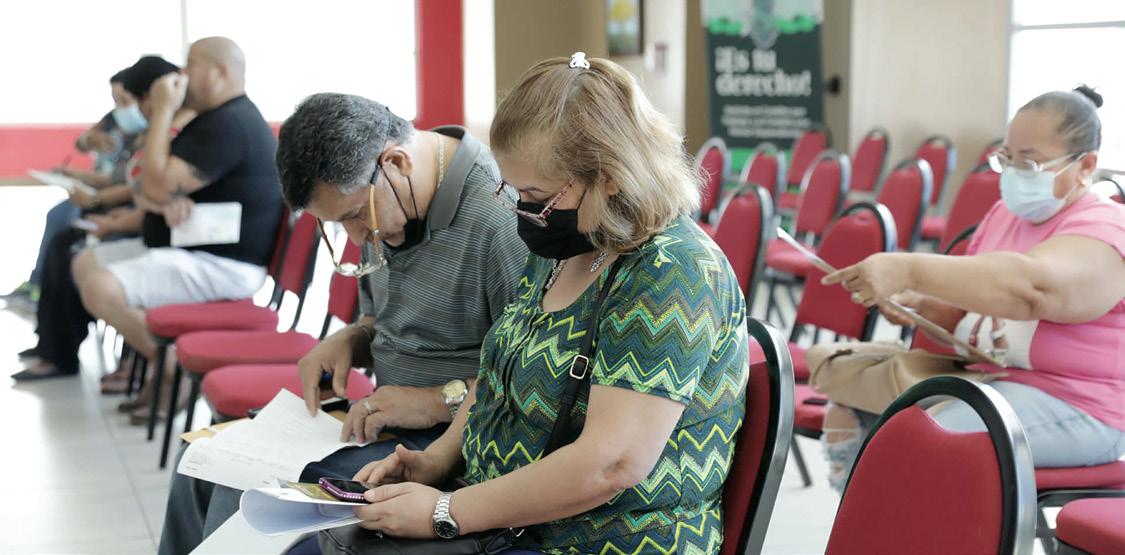
2 minute read
Policy Recommendations
US Congress and Federal Agencies
1. The CTC must be fully refundable. The 2021 CTC decreased child poverty to unprecedented levels, brought peace of mind to thousands of families, reduced food insecurity, and opened pathways to economic mobility. Because it was fully refundable, families that had not received income from employment could receive the credit in its entirety, thus reaching the children who needed it the most.
Advertisement
2. Allow the residents of Puerto Rico to receive the CTC on the basis of 15% of earned income instead of 7.65%, according to the CTC applicable in 2022. For those who do not have federally taxable income, the 2022 CTC is applied per 7.65% of income. 7.65% is the total percentage of payroll taxes (Social Security and Medicare).
3. Foster alliances between the public, private, community, and NGOs to broaden the knowledge of families and expand the scope of free, trustworthy tax return preparation services. The experience with the 2021 CTC shows the potential of these alliances.
4. Reinforce the infrastructure to provide free federal tax return preparation services and reaching agreements with universities to provide incentives to engage students in these efforts.
6. Organize early, ongoing educational campaigns on the benefits of the CTC/EITC, eligibility, and the availability of taxpayer support services. Make these campaigns available in rural areas, the island municipalities (Vieques and Culebra), and to people who have low access to technology.
7. Adapt informational materials from the IRS for a Puerto Rican audience to ensure cultural relevance.
8. Ensure that online tax return preparation tools are available in Puerto Rico at the same time they are available to U.S. residents.
9. Establish information and service agreements between the IRS and the Puerto Rico Department of Treasury that lead to a better experience for CTC applicants, such as having staff from the Puerto Rico Department of Treasury available to prepare federal tax returns, sharing information to solve identity verification issues, and organizing informational campaigns on the CTC and EITC.
5. Expand the scope of free, in-person assistance to provide guidance, tax return preparation, and taxpayer support. These services are essential, as many eligible families do not have the technology and skills to file federal tax returns and solve issues to expedite payment.
10. The IRS and the Puerto Rico Department of Treasury must make available data on the number of CTC and EITC applicants, their characteristics, and disbursement amounts, so that service and public policy organizations can optimize their offerings and share advice on how to increase access and improve the design of these programs.
Puerto Rico's Legislature and Executive Branch
1. Implement a local child tax credit program for families with children that are not eligible for the federal CTC. In recent years, 12 states have implemented a version of child tax credit subsidized by state funding.
2. Maximize CTC and EITC eligibility by strengthening workforce support services, such as trainings on the Workforce Innovation and Opportunity Act (WIOA) and the Community Development Grant Disaster Recovery Fund (CDBG-R), providing daycare and preschool programs that implement 2Gen models so more parents can join the workforce.
3. Include the development of an inclusive economy on the strategic model of PRopósito from the Department of Economic Development and Commerce. This development must be implemented in such a way that no one is left behind and that all families benefit from economic growth, with quality employment to pave the way for economic mobility and to amplify the benefits of the CTC and EITC.
4. Introduce an inclusive framework in recovery projects. Low-income families without a college education and other individuals with employment challenges must be able to access recovery jobs. Information on job openings must be available and accessible to all workers. The Central Office for Recovery, Reconstruction and Resiliency (COR3) should develop inclusion language and guidelines for recovery project awardees to adopt.




